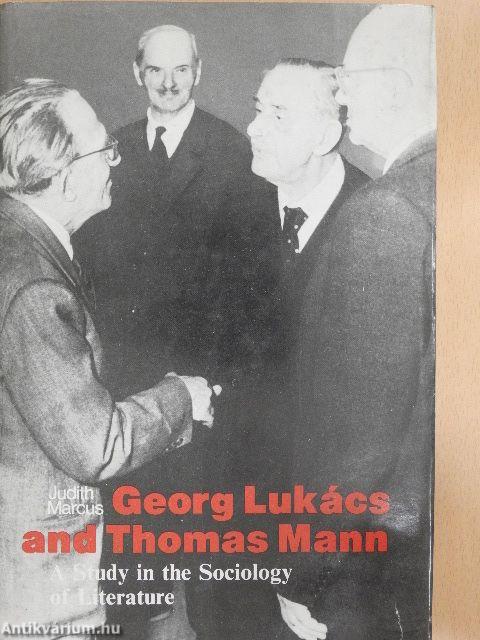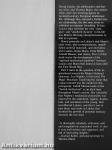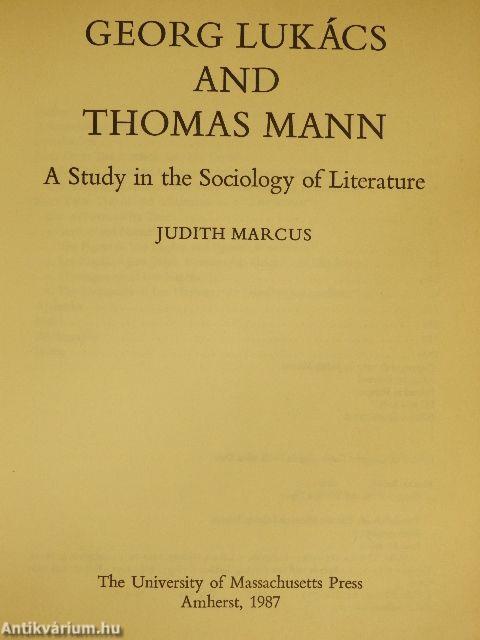1.058.304
kiadvánnyal nyújtjuk Magyarország legnagyobb antikvár könyv-kínálatát

VISSZA
A TETEJÉRE
JAVASLATOKÉszre-
vételek
Georg Lukács and Thomas Mann
A Study in the Sociology of Literature
| Kiadó: | The University of Massachusetts Press |
|---|---|
| Kiadás helye: | Amherst |
| Kiadás éve: | |
| Kötés típusa: | Fűzött keménykötés |
| Oldalszám: | 235 oldal |
| Sorozatcím: | |
| Kötetszám: | |
| Nyelv: | Angol |
| Méret: | 24 cm x 16 cm |
| ISBN: | 0-87023-486-2 |
naponta értesítjük a beérkező friss
kiadványokról
naponta értesítjük a beérkező friss
kiadványokról
Előszó
TovábbFülszöveg
Georg Lukács, the philosopher and literary critic, and Thomas Mann, the creative artist, were two towering figures in twentieth-century European intellectual life. Although they enjoyed a fruitful literary relationship, the two men never established an intimate friendship. In fact, Lukács once said that the only "dark spot" and "unsolved mystery" in his life was Mann's life-long unresponsiveness to him as a person.
Based primarily on Lukács's and Mann's early work, plus correspondence, unpublished archival materials, and interviews with Lukács, Katja Mann, Ernst Bloch, Arnold Hauser, and others, Part I of this study traces the development of the "spiritual-intellectual symbiosis" between Lukács and Mann that lasted at least until the First World War.
Part 2 turns to the question of the inspirational sources for Mann's fictional character, Leo Naphta, in his novel The Magic Mountain. Exploring the claim that Lukács himself was the model for this protagonist, Judith Marcus looks... Tovább
Fülszöveg
Georg Lukács, the philosopher and literary critic, and Thomas Mann, the creative artist, were two towering figures in twentieth-century European intellectual life. Although they enjoyed a fruitful literary relationship, the two men never established an intimate friendship. In fact, Lukács once said that the only "dark spot" and "unsolved mystery" in his life was Mann's life-long unresponsiveness to him as a person.
Based primarily on Lukács's and Mann's early work, plus correspondence, unpublished archival materials, and interviews with Lukács, Katja Mann, Ernst Bloch, Arnold Hauser, and others, Part I of this study traces the development of the "spiritual-intellectual symbiosis" between Lukács and Mann that lasted at least until the First World War.
Part 2 turns to the question of the inspirational sources for Mann's fictional character, Leo Naphta, in his novel The Magic Mountain. Exploring the claim that Lukács himself was the model for this protagonist, Judith Marcus looks at the "Jewish intellectual" as an ideal type throughout Mann's oeuvre. She concludes that Naphta's totalitarian personality was inspired by the radicalism, rigidity, dogmatism, and asceticism of the young, then non-Marxist Lukács, and that it was in part these very traits in Lukács that stymied the growth of personal intimacy between the two men.
"A thoroughly scholarly, extremely well and imaginatively researched work. It also is very well written and organized, and full of interesting insights." —Konrad Kellen, personal secretary to Thomas Mann
Judith Marcus is a research associate at the Graduate Faculty of the New School for Social Research. Her books include Foundations of the Frankfurt School of Soda Research and The Correspondence of the Young Lukács: Dialogue with Weber, Sim-mel, Mannheim, and Others, 1900-1920. She is a Visiting Fulbright Scholar in Hungary.
ISBN 0-87023-486-2
UNIVERSITY OF MASSACHUSETTS PRESS
AMHERST Ó1004 Vissza
Témakörök
- Filozófia > Témaköre szerint > Filozófiatörténet > Tanulmányok
- Idegennyelv > Idegennyelvű könyvek > Angol > Irodalomtörténet
- Idegennyelv > Idegennyelvű könyvek > Angol > Filozófia > Témaköre szerint > Filozófiatörténet > Tanulmányok
- Irodalomtörténet > Világirodalom > Európai irodalom > Német
- Irodalomtörténet > Irodalomtudomány > Tanulmány, tanulmánykötet
- Irodalomtörténet > Irodalomtudomány > Korszakok > 20. századi
- Irodalomtörténet > Irodalomelmélet > Irodalomszociológia
- Filozófia > Témaköre szerint > Magyarországon
- Idegennyelv > Idegennyelvű könyvek > Angol > Filozófia > Témaköre szerint > Magyarországon











